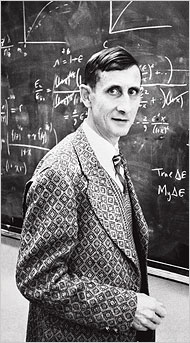Richard Feynman wasn’t the only physicist who emerged from World War II with regrets about his role. Freeman Dyson looks back in anger, anger at himself, believing he failed morally to speak to certain life-and-death decisions, which has made him a Snowden supporter. From a new Paradigm interview with Dyson which was conducted by Theo Constantinou and Lee Nentwig:
Theo Constantinou:
In Jörg Friedrich’s book, The Fire, you were quoted as saying:
“I felt sickened by what I knew. Many times I decided I had a moral obligation to run out into the streets and tell the British people what stupidities were being done in their name. But I never had the courage to do it. I sat in my office until the end, carefully calculating how to murder most economically another hundred thousand people.”
WWII was in full force and you were around twenty years old and making decisions that, from what you say, cost thousands of people their lives. Seventy years later, reflecting back on your actions and the actions of the day, what insight can you give to those facing similar moral dilemmas in the current global climate?
Freeman Dyson:
The amazing thing is how little has changed. There was an American general, James Cartwright, just about a year ago, who was in charge of intelligence in Afghanistan and he wrote a secret report about the deficiencies of intelligence in Afghanistan which was essentially telling the government the idiocies that were being done, and fortunately it was leaked and so now it is out in the public. It was quite amazing to me how much the same it was as to the situation I was in seventy years before. In Afghanistan you had this enormous apparatus for collecting intelligence, which was just what we had in bomber command, and now in Afghanistan you have satellites over head and drones beneath the satellites and then airplanes and people on the ground, all collecting information and sending it all over to some building in Virginia where there were a thousand people analyzing the information. So I was one of them, I was an analyst sitting at bomber command and analyzing all of this information. The general said in his report that all of this was wonderful, that information was being collected efficiently and the analysts were working very hard in understanding it, but nothing ever went back. There was no flow of information to the people that actually needed it and could use it. It was exactly the same problem. We were actually not allowed to talk to the crewmen who flew the airplanes, they weren’t cleared to hear all of the secret stuff, and they were the only people who actually could have used it. So that’s the way it is, it hasn’t changed.
The whole drone program is very troubling, of course. People being killed in this new mechanical way so that you don’t even have to go out there and fight, you can just sit comfortably in Virginia and aim the bombs. That is a bad situation.
So I enormously admire Edward Snowden, he has really done us a great service. We need more people like that … that’s what I wasn’t brave enough to do. I would have been more or less in his situation had I gone out in the streets and shouted, I would have been locked up for sure.•
Tags: Edward Snowden, Freeman Dyson, Lee Nentwig, Theo Constantinou

